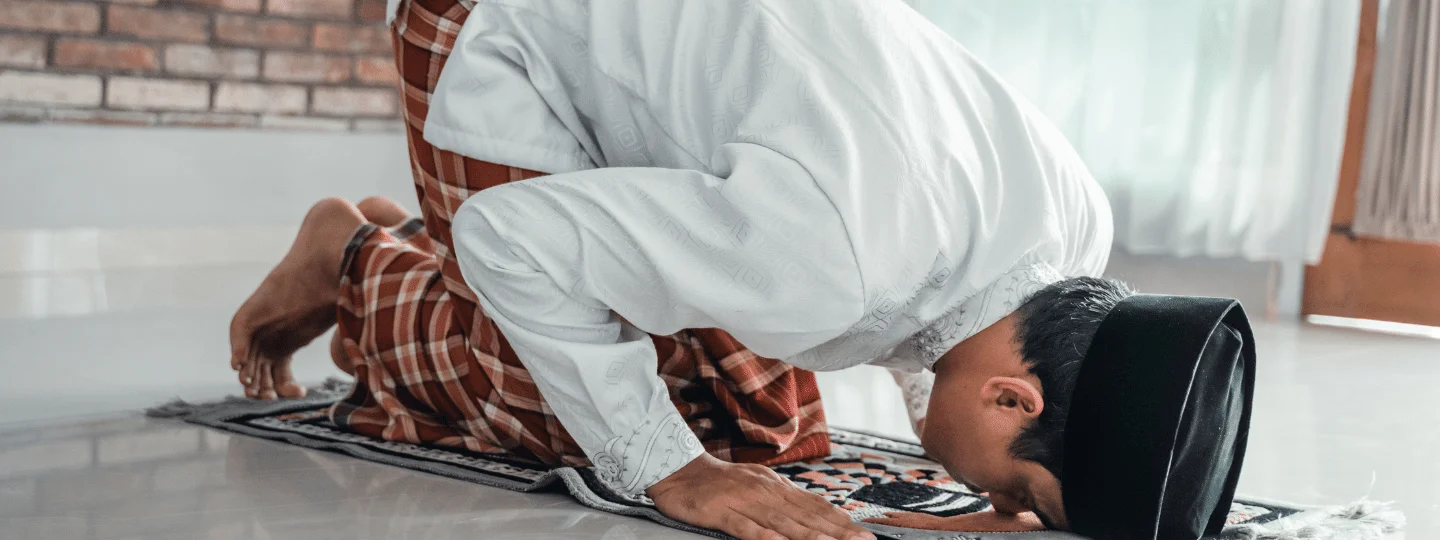Quran
Hadith
Islamic Text
بِسْمِ اللَّهِ الرَّحْمَنِ الرَّحِيمِ
In the Name of Allah Most Merciful Most Kind
Short Answer
It is better to pray Sunnah at home rather than the Masjid. This is because the Prophet ﷺ told us that the best prayer is in the house except for the obligatory prayer. So only obligatory prayer is better in the Masjid. All other prayers are best at home.
Explanation
فَصَلُّوا أَيُّهَا النَّاسُ فِي بُيُوتِكُمْ، فَإِنَّ أَفْضَلَ الصَّلاَةِ صَلاَةُ المَرْءِ فِي بَيْتِهِ إِلَّا المَكْتُوبَةَ
The Prophet ﷺ said: So pray, O people, in your homes. For indeed the best prayer is a person’s prayer in the home. Except for the obligatory prayers. (Sahih al-Bukhari, 731).
In the Hadith above, the Prophet ﷺ makes it clear that it is best for men to pray all prayers at home except for the obligatory prayers. Therefore, it is superior to pray Sunnah at home. Not only Sunnah prayers, but Nafl prayers, are best at home too. However, this is a general rule and there are exceptions to it.
Taraweeh is an exception
وَالْأَفْضَلُ فِي السُّنَنِ الْمَنْزِلُ إِلَّا التَّرَاوِيحَ. (المختار)
The best (option) regarding the Sunnahs is the home. Except for Taraweeh. (Imam al-Mowsili, al-Mukhtar Matn al-Ikhtiyaar).
In the Nass (text) above, we see that Taraweeh is an exception to the general rule. Generally, it is best to pray Sunnah at home. However, Imam al-Mowsili mentioned that this is not the case with Taraweeh. Although Taraweeh is a Sunnah prayer, it is best prayed in the Masjid.
Elsewhere in Hanafi works the scholars clarified that this above ruling is not applicable for someone who has memorised significant portions of the Holy Quran. For such a person it is best to pray at home so they can revise what has been memorised.
Other considerations
Sometimes praying at home can be a problem. For example, a person may face many distractions at home. For such a person it will not be preferable to pray Sunnah at home. Rather, they should pray Sunnah and Nafl at the Masjid.
This remains the case whether the distractions at home jeopardise praying the Sunnahs or even focusing during them. Thus, if someone says, ‘I will pray Sunnah at home but I will not be as focused‘, we will advise such a person to pray in the Masjid.
Similarly, if someone were to say, ‘if I delay them until I return home then I may end up missing them‘, such a person must be advised to pray Sunnah in the Masjid. Therefore, it is clear that other factors must be considered too. Therefore, it is not an absolute rule that it is best to pray Sunnah at home.
وَبِهِ أَفْتَى الْفَقِيهُ أَبُو جَعْفَرٍ قَالَ: إلَّا أَنْ يَخْشَى أَنْ يَشْتَغِلَ عَنْهَا إذَا رَجَعَ، فَإِنْ لَمْ يَخَفْ فَالْأَفْضَلُ الْبَيْتُ. (فتح القدير)
The jurist Abu Jafar gave Fatwa according to this. He said: Unless he fears that he will be distracted from them if he returns. But if he does not fear, then the home is better. (Imam Ibn al-Humaam, Fath al-Qadeer Sharh al-Hidayah).
وَالْأَفْضَلُ فِي النَّفْلِ غَيْرِ التَّرَاوِيحِ الْمَنْزِلُ إلَّا لِخَوْفِ شَغْلٍ عَنْهَا وَالْأَصَحُّ أَفْضَلِيَّةُ مَا كَانَ أَخْشَعَ وَأَخْلَصَ
وَحَيْثُ كَانَ هَذَا أَفْضَلَ يُرَاعَى مَا لَمْ يَلْزَمْ مِنْهُ خَوْفُ شُغْلٍ عَنْهَا لَوْ ذَهَبَ لِبَيْتِهِ، أَوْ كَانَ فِي بَيْتِهِ مَا يَشْغَلُ بَالَهُ وَيُقَلِّلُ خُشُوعَهُ، فَيُصَلِّيهَا حِينَئِذٍ فِي الْمَسْجِدِ لِأَنَّ اعْتِبَارَ الْخُشُوعِ أَرْجَحُ. (رد المحتار)
Imam al-Haskafi: The home is best for Nafl, other than Taraweeh. Unless there is a fear of being busied from it. The more correct view is to give preference to that which leads to greater humility and sincerity.
Imam Ibn Abideen: Since going back home is best, fear of distraction from it should be taken into account. Also, something at home occupying his mind and thus reducing humility (should be considered). In such a case, he should pray it in the Masjid because humility is more important. (Radd al-Muhtar).
Masjid is fine too
It is important to clarify that it is not wrong or sinful to pray Sunnah or Nafl prayers in the Masjid. Rather, that is good. However, it is better to pray Sunnah and Nafl at home. Consequently, one should not rebuke people if they pray Sunnah or Nafl in the Masjid. On the contrary, that should be recognised as something positive. Although this may be the case, one may mention that praying Sunnah and Nafl at home is better still.
وفي المنية التطوع في المسجد حسن وفي البيت أحسن وبه أفتى الفقيه أبو جعفر قال إلا أن يخشى أن يشتغل عنها إذا رجع إلى منزله فإن لم يخف فالأفضل البيت. (حاشية الطحطاوي على مراقي الفلاح)
(He said) in al-Munyah: Voluntary prayer in the Masjid is good. Although it is better in the home. The jurist Abu Jaafar gave Fatwa according to it. He said: Unless he fears that he will be distracted from them if he returns to his home. But if he does not fear, then the home is better. (Imam Ahmad bin Muhammad al-Tahtawi, Haashiyah ala Maraaqi al-Falah).
Conclusion
It is clear in Hadith that it is best to pray Sunnah at home. However, there are exceptions to this rule. Therefore, one should not be overzealous and rebuke people for praying Sunnah or Nafl at the Masjid. Rather, the Imam can gently remind people during sermons, lectures and classes. Despite that, in certain circumstances praying in the Masjid can be superior to the home.
And Allah Most High Knows Best.
–Answered by Shaykh Noorud-deen Rashid (03.04.24)






